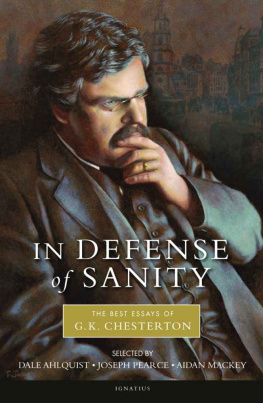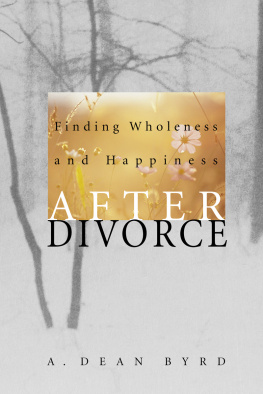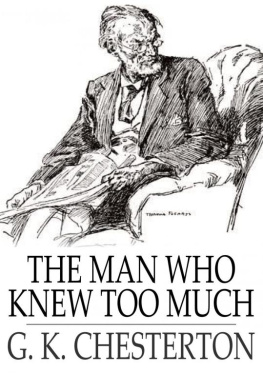DIVORCE
versus
DEMOCRACY
BY
G. K. CHESTERTON
Reprinted from Nashs Magazine
London
SS. PETER & PAUL
Publishers to the Church of England
32 George St., Hanover Square,
and 302 Regent St., W.
1916
Preface
I have been asked to put forward in pamphlet form this rather hasty essay as it appeared in Nashs Magazine; and I do so by the kind permission of the editor. The rather chaotic quality of its journalism it is now impossible to alter. The convictions upon which it is based are unaltered and unalterable. Indeed, in so far as circumstances have since affected them, they are greatly strengthened. In so far as there was something sporadic and seemingly irrelevant in the writing, it was partly because I was contending against an evil that was diffused and indefinable, at once tentative and ubiquitous. Since then that disease has come to a head and burst; primarily in the North of Europe. By that historic habit which generally makes one European people the standard-bearer of a social tendency, which made the Empire a Roman Empire and the Revolution a French Revolution, the North Germans have become the peculiar champions of that modern change which would make the State infinitely superior to the Family. It is even asserted that Prussian political authority is now encouraging the abandonment of common morality for the support of population; and even if this horrible thing be untrue, it is highly significant that it can be plausibly said of Prussia, and certainly of no other Christian State. And in the new light of action it is possible to trace more clearly the trend towards divorce, as also that trend towards the other pagan institution of slavery, which would certainly have accompanied it. But the enslaving force in Europe struck too early; and the whole movement has been brought to a standstill.
The same circumstances have given an importance to a formula of my own which I still think rather important. It may be summarised as the patriotism of the household. In the experience of nationality we do not admit that any excess of despair can come into the same logical world as desertion. No amount of tragedy need amount to treason. The Christian view of marriage conceives of the home as self-governing in a manner analogous to an independent state; that is, that it may include internal reform and even internal rebellion; but because of the bond, not against it. In this way it is itself a sort of standing reformer of the State; for the State is judged by whether its arrangements bear helpfully or bear hardly on the human fulness and fertility of the free family. Thus the Wicked Ten in Rome were condemned and cast down because their public powers permitted a wrong against the purity of a private family. Thus the medival revolt against the Poll Tax began by the authority of an official insulting the authority of a father. Men do not now, any more than then, become sinless by receiving a post in a bureaucracy; and if the domestic affairs of the poor were once put into the hands of mere lawyers and inspectors, the poor would soon find themselves in positions from which there is no exit save by the sword of Virginius and the hammer of Wat Tyler. As for the section of the rich who are still seeking a servile solution, they, of course, are still seeking the extension of divorce. It is only divide et impera; and they want the division of sex for the division of labour. The very same economic calculation which makes them encourage tyranny in the shop makes them encourage licence in the family. But now the free families of five great nations have risen against them; and their plot has failed.
G. K. CHESTERTON
Divorce versus Democracy
O N this question of divorce I do not profess to be impartial, for I have never perceived any intelligent meaning in the word. I merely (and most modestly) profess to be right. I also profess to be representative: that is, democratic. Now, one may believe in democracy or disbelieve in it. It would be grossly unfair to conceal the fact that there are difficulties on both sides. The difficulty of believing in democracy is that it is so hard to believelike God and most other good things. The difficulty of disbelieving in democracy is that there is nothing else to believe in. I mean there is nothing else on earth or in earthly politics. Unless an aristocracy is selected by gods, it must be selected by men. It may be negatively and passively permitted, but either heaven or humanity must permit it; otherwise it has no more moral authority than a lucky pickpocket. It is baby talk to talk about Supermen or Natures Aristocracy or The Wise Few. The Wise Few must be either those whom others think wisewho are often fools; or those who think themselves wisewho are always fools.
Well, if one happens to believe in democracy as I do, as a large trust in the active and passive judgment of the human conscience, one can have no hesitation, no impartiality, about ones view of divorce; and especially about ones view of the extension of divorce among the democracy. A democrat in any sense must regard that extension as the last and vilest of the insults offered by the modern rich to the modern poor. The rich do largely believe in divorce; the poor do mainly believe in fidelity. But the modern rich are powerful and the modern poor are powerless. Therefore for years and decades past the rich have been preaching their own virtues. Now that they have begun to preach their vices too, I think it is time to kick.
There is one enormous and elementary objection to the popularising of divorce, which comes before any consideration of the nature of marriage. It is like an alphabet in letters too large to be seen. It is this: That even if the democracy approved of divorce as strongly and deeply as the democracy does (in fact) disapprove of itany man of common sense must know that nowadays the thing will be worked probably against the democracy, but quite certainly by the plutocracy. People seem to forget that in a society where power goes with wealth and where wealth is in an extreme state of inequality, extending the powers of the law means something entirely different from extending the powers of the public. They seem to forget that there is a great deal of difference between what laws define and what laws do. A poor woman in a poor public-house was broken with a ruinous fine for giving a child a sip of shandy-gaff. Nobody supposed that the law verbally stigmatised the action for being done by a poor person in a poor public-house. But most certainly nobody will dare to pretend that a rich man giving a boy a sip of champagne would have been punished so heavilyor punished at all. I have seen the thing done frequently in country houses; and my host and hostess would have been very much surprised if I had gone outside and telephoned for the police. The law theoretically condemns any one who tries to frustrate the police or even fails to assist them. Yet the rich motorists are allowed to keep up an organised service of anti-police detectiveswearing a conspicuous uniformfor the avowed purpose of showing motorists how to avoid capture. No one supposes again that the law says in so many words that the right to organise for the evasion of laws is a privilege of the rich but not of the poor. But take the same practical test. What would the police say, what would the world say, if men stood about the streets in green and yellow uniforms, notoriously for the purpose of warning pickpockets of the presence of a plain-clothes officer? What would the world say if recognised officials in peaked caps watched by night to warn a burglar that the police were waiting for him? Yet there is no distinction of principle between the evasion of that police-trap and the other police-trapthe police-trap which prevents a motorist from killing a child like a chicken; which prevents the most frivolous kind of murder, the most piteous kind of sudden death.






